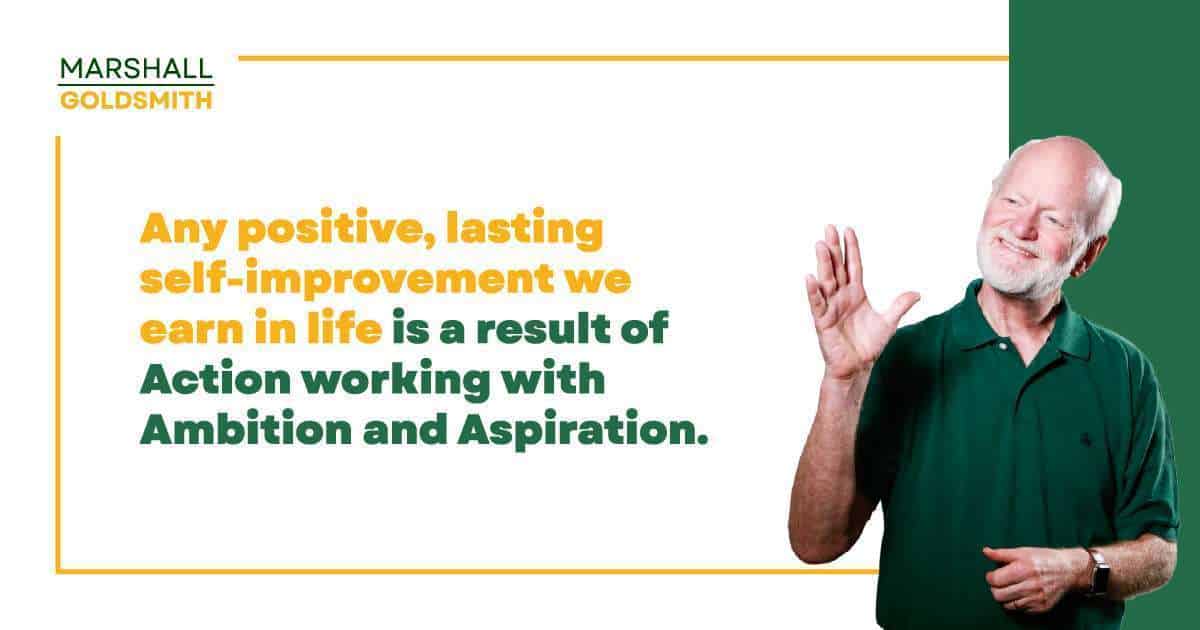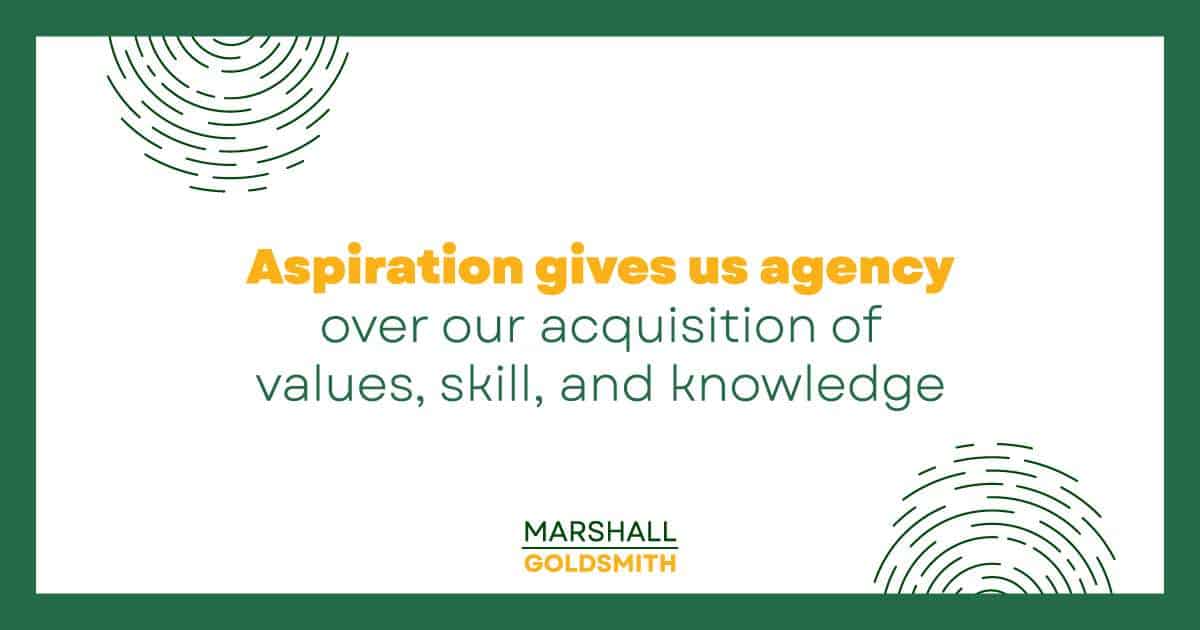Playing Favorites By Marshall Goldsmith There’s a reason I devote...
There are three variables that govern the progress we make toward living a life we seek. These are Action, Ambition, and Aspiration. Action is what we’re doing now. Ambition is what we want to achieve. Aspiration is who we want to become.
Action is now. It’s our choices — what we do.
Ambition and Aspiration are not the same. Ambition is the pursuit of a specific goal with a finish line; we are X, we want to achieve Y. When we hit Y, our specific ambition ends, until we come up with our next ambitious goal.
Aspiration, on the other hand, is a continuing act of self-creation and self-validation. It is not X turning into Y. It is X evolving into Y, then Y plus, then possibly Y squared.
Ambition and Aspiration are not the ruling two-system party that governs our ability to live an earned life. Ambition and Aspiration cannot function properly without Action. I call them independent variables because we can isolate them to understand their unique properties.
I can keep a log of all my Action episodes in a day or week and study them to see what I do with my time, adding up the hours I’m being productive or distracted or lazy or running errands — but none of this is meaningful unless I can attach the data to a purpose shaped by my Ambition and Aspiration.
Any positive, lasting self-improvement we earn in life is a result of Action working with Ambition and Aspiration. When these three independent variables serve each other, we are unstoppable. Fulfillment is in our future, regret is off the table.
Unfortunately, that doesn’t happen as often as we like. And it’s easier to understand than to execute.
I Here I want to focus on Aspiration to establish how radically it differs from Ambition and why so many of us can articulate our Ambitions, but not our Aspirations—and vice versa.
The reason we find it so hard to create our own life, or even why we balk at making any kind of change, regardless of the specifics, is that we do not know in advance what our newly imagined life will feel like or whether we’ll like it. That’s because there’s no hard stop to one phase of life that immediately jump-starts our next life phase.

We do not radically alter from old-us into new-us in the course of a day. It’s a long and gradual process, enlightening us with glimpses of our future along the way. This is the process that the University of Chicago philosopher Agnes Callard calls “aspiration” (her book on the subject is fittingly titled Aspiration: The Agency of Becoming).
Consider the decision to have children—a big life choice and unlike all our other choices because it not only creates a new life for us as parents, but literally creates the new life of our child. Before becoming parents, we are free to enjoy our childlessness, perhaps by working fourteen hours a day, or going rock climbing on weekends, or taking cooking classes at night.
We know that having a child will curtail our lifestyle—and it’s possible we’ll resent the loss of our unencumbered time. But we do not know that for sure, nor can we anticipate the fulfillment we’ll find in cradling our baby for hours until she falls asleep, or all the other baby duties we dreaded in our pre-parental life.
Aspiration is the bridge between childlessness and becoming a parent. The nine months of pregnancy—dominated by elation, anxiousness, preparation, prenatal tests, and self-care—are part of the aspiring process as we try on the emotions and values we hope to acquire one day. It’s like a summer internship—when we test-drive a new job—only with an enormous lifetime commitment at the end.
Professor Callard says we should not think of becoming a parent as a single discrete event when we decide to have a child. It’s a process: “Old Person aspires to become New Person.” There’s something heroic about our aspiration, she believes, because we have an “anticipatory and indirect grasp” of the goodness to which we’re aspiring. We aspire with no guarantee that we’ll get what we came for or be happy with it when we do get it.
Aspiration, says Professor Callard, is “the rational process by which we work to care about something new.” It gives us agency over our acquisition of values, skill, and knowledge.
But that acquisition is not instant; it proceeds over time, demanding patience. It lets us dip our toes into the water to see if we like it before committing to a long swim, largely on our own terms, unrushed and unpressured.
In that sense, the process of aspiring is like a journalist’s research and reporting on the way to writing a story. The journalist does not know the full story at the start, nor do they know how it ends until they’re finished investigating and interviewing, nor do they know the story’s meaning until they gather all their materials and write it.
Writing the story involves deletion, revision, midcourse corrections, frustrating stops and restarts, and sometimes abandoning the enterprise altogether. The journalist did not know any of this when they started. As the words and pages accumulate, they get closer to fulfilling their initial intention.
This aspirational act—an act of bridging Old Person with intention to New Person who is realizing that intention—is how they experience fulfillment rather than regret.
There is another difference between Ambition and Aspiration that deserves our scrutiny. Ambition, when we achieve it, delivers a feeling of happiness that we cannot hold on to and protect.
We get the promotion, win the club championship, or finish the marathon in under three hours. We celebrate the achievement.
For a brief period, we’re happy (or, more likely, not quite as happy as we thought we’d be). Then the feeling dissipates, and we channel our inner Peggy Lee in her famous song when we ask, “Is that all there is?”

Adding Too Much Value Won’t Get You There By Marshall...
C-Suite Master Class: No, But, However By Marshall Goldsmith Continuing...
The Doerr Institute: Expanding the Market for Coaches By Marshall...
Making Leadership Development Part of the College Degree at Rice...
Sanyin Siang – Winner of the Thinkers50 Marshall Goldsmith Coaching...
Thinkers50 Marshall Goldsmith Distinguished Achievement Award in Coaching – Nominees...
Leading with Influence: What Is Influence360°? By Marshall Goldsmith Founder...
Are You a Dominator, Manipulator, Persuader or Influencer? By Marshall...
Leading with Influence: Redefining Modern Influence Part 2 By Marshall...
My mission is simple. I want to help successful people achieve positive, lasting change and behavior; for themselves, their people, and their teams. I want to help you make your life a little better. With four decades of experience helping top CEOs and executives overcome limiting beliefs and behaviors to achieve greater success, I don’t do this for fame and accolades. I do this because I love helping people!
As an executive educator and coach, I help people understand how our beliefs and the environments we operate in can trigger negative behaviors. Through simple and practical advice, I help people achieve and sustain positive behavioral change.